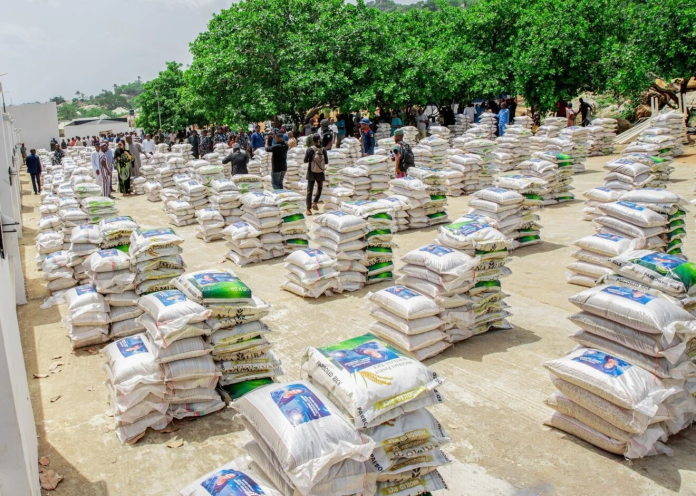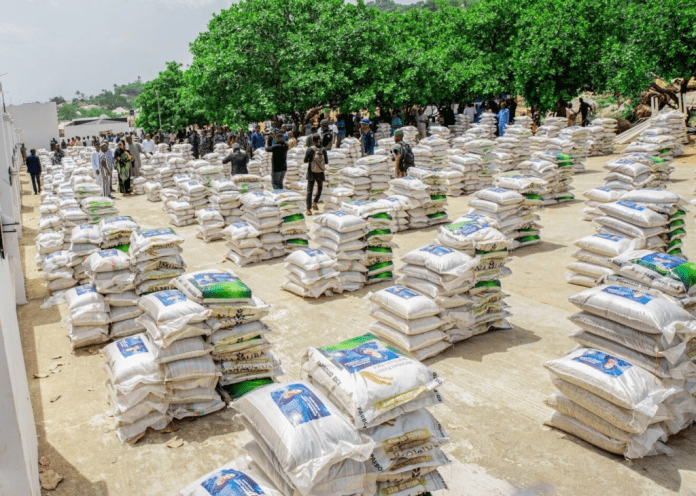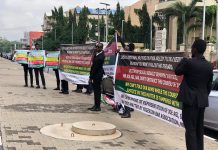

Some stakeholders in Kogi, Niger and Nasarawa states have called on governments and spirited individuals to always adopt decentralised and systematic measures in the distribution of palliatives to avoid stampede.
They told the News Agency of Nigeria (NAN) in separate interviews on Wednesday in Lokoja, Minna and Lafia that such measures had become imperative to avoid a repeat of recent cases of stampede during palliatives distribution exercise in Lagos, Keffi and Bauchi where two students and others lost their lives.
In Lokoja, Prof. Alewo Johnson-Akubo, the Vice Chancellor, Salem University Lokoja, said that government had never been effective in the of distribution of palliatives to deserving poor people in the society.
Johnson-Akubo regretted that corruption of top government functionaries had always come to play during such exercises.

“Therefore, if you want to achieve success in palliatives distribution, government and its officials should completely steer clear of it.
“They should allow Non-Governmental Organisations, spirited individuals of proven integrity, religious leaders and the traditional rulers should be engaged in the distribution so that targeted persons can get the Palliatives.
“Even if these set of people have interest, it will be minimal compared to government officials. This is the way I think they should go to succeed and avoid wastage of lives of innocent citizens,” he said.
Also, Dr Ibrahim Nasir, a lecturer in the Department of Political Science, Prince Abubakar Audu University (PAAU), Ayingba, Kogi, said that the death of students while scrambling for palliatives was unfortunate.
Nasir asserted that the general issue surrounding the issue was insincerity and greed on the part of those distributing the palliatives due to poor planning and execution.
He also said that it was unfortunate that the students also were inpatient due to lack of trust, more so they didn’t know whether it would get to their turn.
“What government should do going forward to avoid future occurrence is to put in place the usual payment of bursary/scholarship to students as we use to know.
“This is far more scientific and better way to reduce the suffering of students without necessarily having to lose any life due to stampede.
“In addition, government should reduce school fees paid by students as a way of palliatives instead of distributing food items, ” he said.
On his part, Retired Commodore Jerry Omodara, the Special Adviser (SA) to Gov. Usman Ododo of Kogi, said that distribution of palliatives in the state has always been done in a systematic way and always directed at the most vulnerable people.
Omodara said: “We designed a system where the items can trickle down to the masses at the grassroots.
“Firstly, the people must see the genuineness of government in distribution of the palliatives. It should be done as we did here in Kogi.
“The beneficiaries sit in their houses and the palliatives will get to them without any problem. This is because it was distributed through the ocal government chairmen of the 21 Local Government Areas with specific instructions and strict supervision with adequate security that it must get to the 239 units of the state.
“The downtrodden and the people that really need the palliatives must first be identified in the units and be monitored for it to get to them as expected.”
Omodara advised that there should be a feedback mechanism that would enable the government to know the true position of things all over the benefitting units through the Ministry of Local Governments and Ministry of Humanitarian Affairs as well as the Office of Special Advisor on security.
According to him, this will make those involved in the distribution to be more careful and not to go outside the laid down principles or system.
“Ours palliatives distributions here in Kogi, on two occasions have very successful because we put up adequate security and followed the instructions of government, especially from the loading and delivery to the 21 LGAs of the state,” he said.
In Minna, Mr Suleiman Farinwata, a public affairs analyst, called on the three tiers of government to identify the target beneficiaries of any palliative before distributing the items to the people.
He said that the measure would prevent stamped that sometimes result in death of people and corrupt tendencies which prevent the targeted people from getting the items.
Farinwata said that, “the government must first identify the beneficiaries of every palliatives before embarking on distribution of such items to the people or else there will be stamped and corruption where others will get the items at the expense of intended beneficiaries.
“Another way we can prevent stampede during the sharing of palliatives is to allow the beneficiaries/communities to constitute a committee made up of people with proven integrity.
“Among these class of people, we have the youth, middle age and elderly, but you find out that the politicians who are in charge will not appoint responsible people to take charge of the distribution of palliatives because of their selfish interests.”
He opined that when responsible persons are appointed into committees, the politicians should supervise them to ensure that they deliver accordingly.
Farinwata also said that there was the need for adequate public announcement on the distribution of the palliatives, quantity and feedback mechanism from the beneficiaries.
“Once this is done you will see things working naturally,” he said.
In Lafia, Mr Ezekiel Baba, a lecturer at the state’s College of Agriculture, Science and Technology Lafia, applauded the palliatives distribution initiative aimed at addressing the short term effect of the hardship on the people.
“There are short, medium and long term measures to address the current hardship, and distribution of palliatives is a short term measure,” he said.
The lecturer, however, appealed to the government to be more proactive in terms of logistic and security arrangement for the distribution exercise in future.
He also charged the beneficiaries, especially students to organise themselves properly and follow the laid down procedures for distribution of palliatives in order to avoid the recent sad incident where two students died in Keffi.
On his part, Francis Ewuga , a Secondary school teacher, said that the government should have declared free education for one semester as palliative.
Ewuga noted that doing so could have prevented the stampede that had happened at the Nasarawa State University Keffi.
“How will you share food to 3, 000 students in an institution with over 20, 000 students and expect orderliness,” he said.
Saidu Bako, a parent expressed gratitude to the government for the gesture, but appealed that all students be considered for the palliative.
He also said that the government should utilise the existing structures such as departments and faculties for the distribution to avoid further loss of lives. (NAN)
Join Television Nigerian Whatsapp Now
Join Television Nigerian Facebook Now
Join Television Nigerian Twitter Now
Join Television Nigerian YouTUbe Now





